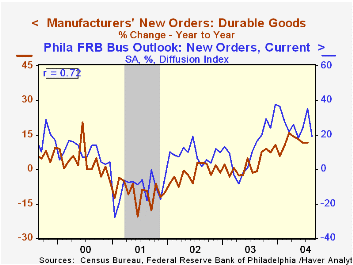 Global| Aug 25 2004
Global| Aug 25 2004Surge In Aircraft Lifts U.S. Durable Goods Orders
by:Tom Moeller
|in:Economy in Brief
Summary
A 37.2% m/m surge in orders for aircraft raised durable goods orders in July by 1.7% versus Consensus expectations for a 1.0% rise. Less aircraft durable orders fell 0.5% (+8.3% y/y), the third m/m decline in the last four. The rise [...]

A 37.2% m/m surge in orders for aircraft raised durable goods orders in July by 1.7% versus Consensus expectations for a 1.0% rise. Less aircraft durable orders fell 0.5% (+8.3% y/y), the third m/m decline in the last four.
The rise in new aircraft orders was powered by a doubling of orders for commercial aircraft that offset a one-third drop in defense aircraft bookings.
Higher aircraft orders raised the nondefense capital goods total by 9.0%, but less aircraft capital goods orders rose just 0.6% (11.0% y/y).
Orders for computers & electronic products fell 3.8% (+2.0% y/y), the third m/m decline in the last four. Computer orders fell 6.7% (-0.6% y/y) though a 5.0% rise in electrical equipment, appliance & component orders recouped half of the prior two months' decline. Machinery orders added 2.1% (18.0% y/y) to a 1.1% rise in June.
During the last ten years there has been a 58% correlation between the y/y change in durable goods orders and the orders component of the Philadelphia Federal Reserve's Business Outlook Survey. That correlation rose to 72% during the last five years.
Shipments of durable goods rose 0.1% (8.3% y/y) after a 1.1% June gain. Shipments excluding the transportation sector rose 1.7% (+12.6% y/y) after a 1.2% spurt in June.
Durable inventories rose 0.8% (3.4% y/y) for the third straight month.
New research from the Federal Reserve Bank of New York titled "The Relationship between Manufacturing Production and Goods Output" is available here.
| NAICS Classification | July | June | Y/Y | 2003 | 2002 | 2001 |
|---|---|---|---|---|---|---|
| Durable Goods Orders | 1.7% | 1.1% | 11.7% | 2.6% | -1.7% | -10.5% |
| Non-defense Capital Goods | 9.0% | 1.1% | 19.4% | 5.6% | -7.2% | -15.5% |
Tom Moeller
AuthorMore in Author Profile »Prior to joining Haver Analytics in 2000, Mr. Moeller worked as the Economist at Chancellor Capital Management from 1985 to 1999. There, he developed comprehensive economic forecasts and interpreted economic data for equity and fixed income portfolio managers. Also at Chancellor, Mr. Moeller worked as an equity analyst and was responsible for researching and rating companies in the economically sensitive automobile and housing industries for investment in Chancellor’s equity portfolio. Prior to joining Chancellor, Mr. Moeller was an Economist at Citibank from 1979 to 1984. He also analyzed pricing behavior in the metals industry for the Council on Wage and Price Stability in Washington, D.C. In 1999, Mr. Moeller received the award for most accurate forecast from the Forecasters' Club of New York. From 1990 to 1992 he was President of the New York Association for Business Economists. Mr. Moeller earned an M.B.A. in Finance from Fordham University, where he graduated in 1987. He holds a Bachelor of Arts in Economics from George Washington University.
More Economy in Brief
 Global| Feb 05 2026
Global| Feb 05 2026Charts of the Week: Balanced Policy, Resilient Data and AI Narratives
by:Andrew Cates






